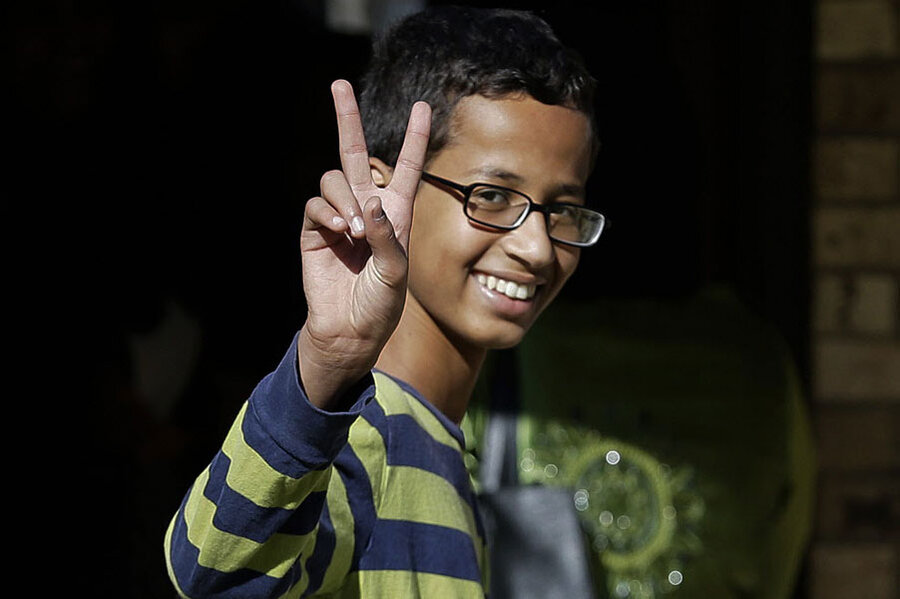Muslim group in Texas doesn't fault school or police for detention
| Irving, Texas
One of the largest Muslim groups in Texas said Thursday that it does not fault police and school officials who handcuffed and suspended a 14-year-old Muslim boy after he brought a homemade clock to class that they mistook for a possible bomb.
Instead, Khalid Hamideh of the Islamic Association of North Texas blamed political leaders for espousing inflammatory anti-Muslim rhetoric and creating a "climate of fear."
"We're not pointing a finger at the school district or the police department," Mr. Hamideh said. "Under the current climate that exists in this country, you can't really blame them because when they see something like that, they have to react."
The association operates the mosque attended by the family of Ahmed Mohamed, the suburban Dallas student who became a sensation on social media after word spread about his clock and the way he was treated.
Ahmed was pulled from class Monday after he showed the device to a teacher. He was questioned by the principal and police, then handcuffed and taken to the police station.
The Muslim community is concerned that Ahmed was interrogated without a lawyer or his parents present and was led out in handcuffs, Hamideh said.
Irving Police Chief Larry Boyd has said department policy requires that handcuffs be used to protect officers and others.
Authorities declined to seek charges against the boy, saying there was no evidence he intended to cause alarm. They said he's free to retrieve his clock at the police station.
A police photo of the device shows a carrying case containing a circuit board and power supply wired to a digital display.
School district spokeswoman Lesley Weaver did not return a call for comment Thursday but previously said school administrators followed district policy, which allows staff to take action if a student has a "look-alike" weapon or engages in behaviors that "substantially disrupt or materially interfere with school activities."
Ahmed's father, Mohamed Elhassan Mohamed, said Thursday that his son would not be returning to MacArthur High School. He said the family is still deciding where he will go next.
The boy's sister, Ayisha Mohamed, 17, said she believes her brother's experience is helping to change people's minds about Muslims.
She said her "heart just dropped" when she heard police had detained him. "It was a bad thing that turned into a blessing," she said.
As Ahmed's story spread across social media, Twitter soon erupted with support for the teen. The hashtag #IStandWithAhmed was tweeted more than 1 million times.
President Barack Obama invited him to the White House, and Facebook founder Mark Zuckerberg posted that he wanted to meet him. A NASA scientist asked Ahmed to give him a call in a couple of years for a job opportunity.
Texas Gov. Greg Abbott also weighed in, cautioning that he did not know all the facts but that police were wrong to detain the boy.
"The last thing we want to do is put handcuffs on a kid unjustifiably," Gov. Abbott told The Dallas Morning News. "It looks like the commitment to law enforcement may have gone too far."
On Thursday, Irving high school students said Ahmed has a reputation as a tinkerer and creator. He made small robotics, fixed phones and assembled a remote that could turn on projectors at school, they said.
"I remember seeing him in middle school, and he used to always bring stuff," said Sara Williams, 15. "He was just one of those kids that created stuff."
Nicholas Martin, also 15, said authorities "were just taking precautions" when they confiscated the clock, but he believes they overreacted because of Ahmed's ethnicity.
Ahmed's father emigrated from Sudan and twice ran for the presidency of that country.
Fourteen-year-old Pedro Andrade said school officials were right to be cautious but added, "If they really did think that it was a bomb, why didn't they evacuate?"
The controversy follows other incidents this year involving anti-Muslim sentiment, including a backlash against a proposed Muslim cemetery northeast of Dallas and a Republican lawmaker who told her staff to ask visiting Muslims to declare allegiance to America.
Also, the Irving City Council endorsed one of several bills in the state legislature to forbid judges from making rulings based on "foreign laws," language that some people say is aimed at Islam out of fear that American courts could somehow be influenced by the religion's Sharia law.
"All of these people who push this hate agenda need to engage the Muslim community and to understand the Muslim identity in this country," Hamideh said.
Back in May, Texas law enforcement was on heightened alert when two men opened fire in the Dallas suburb of Garland outside a center hosting a cartoon contest with depictions of the prophet Muhammad. Both attackers were shot dead, and an officer was shot in the leg. From the other side of the world, the Islamic State group made an unproven claim of responsibility.
Cathie Adams, president of the conservative Texas Eagle Forum and former chairwoman of the Texas Republican Party, said Thursday that Ahmed's clock looked suspicious and that authorities were right to act.
She said the boy was "pushing the envelope" and provoking a response. "Was he testing the system? And why?"






